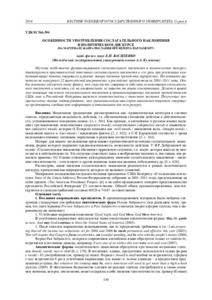Please use this identifier to cite or link to this item:
https://elib.psu.by/handle/123456789/11239Full metadata record
| DC Field | Value | Language |
|---|---|---|
| dc.contributor.author | Василенко, Е. Н. | - |
| dc.date.accessioned | 2015-03-28T11:38:57Z | - |
| dc.date.available | 2015-03-28T11:38:57Z | - |
| dc.date.issued | 2014 | - |
| dc.identifier.citation | Вестник Полоцкого государственного университета. Серия A, Гуманитарные науки : научно-теоретический журнал. - 2014. - № 10. – C. 140-143. | ru_RU |
| dc.identifier.issn | 2070-1608 | - |
| dc.identifier.uri | https://elib.psu.by/handle/123456789/11239 | - |
| dc.description | Peculiarities of the Use of the Conjuctive Mood in Political Discourse (Based on the Genre of the Presidential Address to the Parliament) E. Vasilenko | ru_RU |
| dc.description.abstract | Изучены особенности функционирования сослагательного наклонения в политическом дискурсе. Анализируется прагматический потенциал сослагательного наклонения и его роль при реализации коммуникативных тактик говорящего в рамках жанра послания президента парламенту. Исследование выполнено на материале 22 выступлений американских и российских президентов за 2001–2011 годы. Особое внимание уделяется тому факту, что стремление говорящего избегать использования сослагательного наклонения и заменять его на изъявительное не зависит от языка коммуникации. Делается вывод, что основным значением сослагательного наклонения в проанализированных посланиях президентов как США, так и Российской Федерации является гипотетичность с оттенком желания. Полученные лингвистические данные подтверждают, что грамматическая категория наклонения позволяет говорящему представить сообщаемую информацию в оптимальном. = The author studies the peculiarities of functioning of the conjunctive mood in political discourse. The pragmatic potential of the conjunctive mood and its role in the realization of the speaker’s communicative tac-tics within the genre of the presidential address to the parliament are determined. The study is based on 22 speeches made by American and Russian presidents in 2001–2011. Particular attention is paid to the fact that the speaker’s desire to avoid the use of the conjunctive mood and to replace it by the indicative one doesn’t de-pend on the language of communication. The article also substantiates that the basic meaning of the conjunctive mood in the texts analyzed is a hypothetical one with the shade of volition. The linguistic data assert that the grammatical category of mood helps the speaker to present information in a favourable perspective. | ru_RU |
| dc.language.iso | ru | ru_RU |
| dc.publisher | Полоцкий государственный университет | ru_RU |
| dc.relation.ispartof | Вестник Полоцкого государственного университета. Серия A, Гуманитарные науки | ru_RU |
| dc.relation.ispartof | Веснік Полацкага дзяржаўнага ўніверсітэта. Серыя А, Гуманітарныя навук | be_BE |
| dc.relation.ispartof | Herald of Polotsk State University Series A, Humanity sciences | en_EN |
| dc.relation.ispartofseries | Серия A, Гуманитарные науки;2014. - № 10 | - |
| dc.rights | open access | ru_RU |
| dc.subject | Государственный рубрикатор НТИ - ВИНИТИ::ОБЩЕСТВЕННЫЕ НАУКИ::Языкознание | ru_RU |
| dc.subject | Лингвистика текста | ru_RU |
| dc.title | Особенности употребления сослагательного наклонения в политическом дискурсе (на материале жанра послания президента парламенту) | ru_RU |
| dc.type | Article | ru_RU |
| Appears in Collections: | 2014, № 10 | |
Files in This Item:
| File | Description | Size | Format | |
|---|---|---|---|---|
| 140-143.pdf | 163.39 kB | Adobe PDF |  View/Open |
Items in DSpace are protected by copyright, with all rights reserved, unless otherwise indicated.